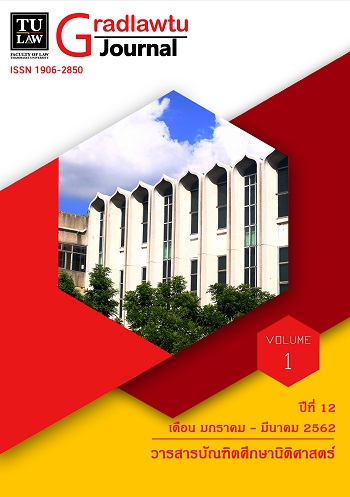ปัญหากฎหมายเกี่ยวกับการสืบมรดก ตามมาตรา 1607
คำสำคัญ:
สืบมรดก, รับมรดกแทนที่, ถูกกำจัดมิให้รับมรดกบทคัดย่อ
บทความนี้มุ่งศึกษาที่มาและเจตนารมณ์ของหลักกฎหมายเรื่องการสืบมรดกหลังจากที่ทายาทถูกกำจัดมิให้รับมรดก ตลอดจนผลทางกฎหมายของการสืบมรดกโดยเหตุดังกล่าว จากการศึกษาพบว่า หลักกฎหมายเกี่ยวกับการสืบมรดกเมื่อทายาทถูกกำจัดมิให้รับมรดกเป็นหลักกฎหมายใหม่ซึ่งปรากฏในประมวลกฎหมายแพ่งและพาณิชย์ที่ได้ประกาศใช้ในปี พ.ศ. 2478 และเป็นมาตราที่มีเนื้อหาเหมือนที่บัญญัติไว้ในกฎหมายต่างประเทศที่ใหม่ที่สุดในขณะนั้น เช่น ประมวลกฎหมายแพ่งเยอรมันและประมวลกฎหมายแพ่งฝรั่งเศส ทั้งนี้ ในบริบทของการถูกกำจัดมิให้รับมรดกนั้นกฎหมายมีเจตนารมณ์ที่จะลงโทษทายาทผู้ประพฤติตนไม่เหมาะสมบางประการตามที่กฎหมายกำหนดไว้โดยกำจัดสิทธิในการรับมรดกของทายาทนั้น และการลงโทษดังกล่าวมีผลเป็นการเฉพาะตัว การที่การถูกกำจัดมิให้รับมรดกมีผลเป็นการเฉพาะตัวนั่นเอง กฎหมายจึงให้ผู้สืบสันดานของทายาทซึ่งถูกกำจัดมิให้รับมรดกสืบมรดกต่อไปได้เสมือนหนึ่งว่าทายาทซึ่งถูกกำจัดมิให้รับมรดกนั้นตายแล้ว ตามมาตรา 1607 แห่งประมวลกฎหมายแพ่งและพาณิชย์ อย่างไรก็ตาม มาตรา 1607 บัญญัติไว้เพียงสั้น ๆ และขาดความชัดเจน จึงทำให้เกิดปัญหาในการตีความเพื่อบังคับใช้ว่าการสืบมรดกโดยผู้สืบสันดานของทายาทซึ่งถูกกำจัดมิให้รับมรดกจะต้องอยู่ภายใต้หลักเกณฑ์เดียวกันกับการรับมรดกแทนที่ตามมาตรา 1639 (ซึ่งเป็นบทบัญญัติที่กำหนดหลักเกณฑ์เกี่ยวกับกรณีที่ทายาทโดยธรรมถูกกำจัดมิให้รับมรดก) หรือไม่
บทความนี้จึงมุ่งศึกษาว่า (1) บทบัญญัติเกี่ยวกับการสืบมรดกโดยผู้สืบสันดานของทายาทซึ่งถูกกำจัดมิให้รับมรดกอยู่ภายใต้หลักเกณฑ์เดียวกันกับกรณีการรับมรดกแทนที่หรือไม่ (2) หลักเกณฑ์เกี่ยวกับการสืบมรดกโดยผู้สืบสันดานใช้บังคับในกรณีที่ทายาทซึ่งถูกกำจัดมิให้รับมรดกเป็นทายาทประเภทใด และ (3) ผู้สืบสันดานของทายาทที่ถูกกำจัดมิให้รับมรดกต้องเป็นผู้สืบสันดานโดยตรงหรือไม่ วิทยานิพนธ์นี้เสนอแนะแนวทางที่เหมาะสมเพื่อสามารถตีความหลักกฎหมายเกี่ยวกับการสืบมรดกโดยผู้สืบสันดานของทายาทซึ่งถูกกำจัดมิให้รับมรดกให้เกิดความชัดเจนและสอดคล้องกับเจตนารมณ์อันแท้จริงของกฎหมาย ทั้งนี้ โดยศึกษาหลักกฎหมายไทยเปรียบเทียบกับหลักกฎหมายของประเทศญี่ปุ่น ฝรั่งเศส และเยอรมัน
จากการศึกษาผู้เขียนเสนอแนะให้ตีความดังต่อไปนี้ ประการแรก หลักกฎหมายเกี่ยวกับการสืบมรดกโดยผู้สืบสันดานของทายาทซึ่งถูกกำจัดมิให้รับมรดกตามมาตรา 1607 อยู่ภายใต้หลักเกณฑ์เดียวกันกับกรณีการรับมรดกแทนที่ ประการที่สอง หลักกฎหมายดังกล่าวใช้บังคับเฉพาะในกรณีที่ทายาทซึ่งถูกกำจัดมิให้รับมรดกเป็นทายาทโดยธรรมตามมาตรา 1629 (1) (3) (4) หรือ (6) เท่านั้น และประการสุดท้าย ผู้สืบสันดานของทายาทที่สามารถเข้าสืบมรดกได้ต้องเป็นผู้สืบสันดานโดยตรงตามสายโลหิต ทั้งนี้ ควรมีการแก้ไขกฎหมายโดยยกเลิกประมวลกฎหมายแพ่งและพาณิชย์มาตรา 1607 และแก้ไขประมวลกฎหมายแพ่งและพาณิชย์มาตรา 1639
คำสำคัญ
สืบมรดก, รับมรดกแทนที่,ถูกกำจัดมิให้รับมรดก
เอกสารอ้างอิง
2.โชค จารุจินดา. คำบรรยาย ลักษณะมรดก. พิมพ์ครั้งที่ 1. กรุงเทพมหานคร : โรงพิมพ์ อักษรไทย, 2519.
3.บวรศักดิ์ อุวรรณโณ. คำอธิบายกฎหมายแพ่งและพาณิชย์ ว่าด้วย มรดก. พิมพ์ครั้งที่ 2. กรุงเทพมหานคร : สำนักพิมพ์นิติธรรม, 2548.
4.พินัย ณ นคร. กฎหมายลักษณะมรดก. พิมพ์ครั้งที่ 4. กรุงเทพมหานคร : โรงพิมพ์เดือนตุลาคม, 2558.
5.พรชัย สุนทรพันธุ์ . คำอธิบายกฎหมายลักษณะมรดก. พิมพ์ครั้งที่ 9. กรุงเทพมหานคร : บริษัท กรุงสยาม พับลิชชิ่ง จำกัด, 2558.
6.เพรียบ หุตางกูร. คำอธิบายประมวลกฎหมายแพ่งและพาณิชย์ ว่าด้วย มรดก. พิมพ์ครั้งที่ 15. กรุงเทพมหานคร : โรงพิมพ์เดือนตุลา, 2560.
7.สอาด นาวีเจริญ. คำบรรยายประมวลกฎหมายแพ่งและพาณิชย์ บรรพ 6 ว่าด้วย มรดก. พิมพ์ครั้งที่ 1. กรุงเทพมหานคร : สำนักพิมพ์นิติบรรณาการ , 2517.
8.อัมพร ณ ตะกั่วทุ่ง. คำอธิบายประมวลกฎหมายแพ่งและพาณิชย์ ว่าด้วย มรดก. กรุงเทพมหานคร : สำนักพิมพ์นิติบรรณาการ, 2539.
9.อาจารี มีอินทร์เกิด มีสิทธิ์. คำอธิบายประมวลกฎหมายแพ่งและพาณิชย์ บรรพ 6 ว่าด้วยมรดก. พิมพ์ครั้งที่ 1. กรุงเทพมหานคร : สำนักพิมพ์นิติธรรม, 2557.
10.กฤษฎา กนกกุลชัย. “ปัญหาการตีความกฎหมายในการรับมรดกแทนที่ : ศึกษากรณีการบังคับใช้ประมวลกฎหมายแพ่งและพาณิชย์มาตรา 1639.” วิทยานิพนธ์มหาบัณฑิต คณะนิติศาสตร์ปรีดีพนมยงค์ มหาวิทยาลัยธุรกิจบัณฑิตย์, 2557.
11.ศิริศักดิ์ ศุภมนตรี. “การรับมรดกแทนที่.” วิทยานิพนธ์มหาบัณฑิต คณะนิติศาสตร์ มหาวิทยาลัยธรรตร์, 2524.มศาส
12.กีรติ กาญจนรินทร์. “การสืบมรดกตาม ป.พ.พ. มาตรา 1607.” ดุลพาห. เล่มที่ 2. ปีที่ 55. (พฤษภาคม – สิงหาคม 2551) : 57-59.
13.พรชัย สุนทรพันธุ์. “ปัญหาเกี่ยวกับการรับมรดกแทนที่.” วารสารเกษมบัณฑิต. เล่มที่2. ปีที่ 17. (กรกฎาคม-ธันวาคม 2559) : 1-15.
14.โสต สุตานันท์. “การสืบมรดกกับการรับมรดกแทนที่กัน.” ดุลพาห. เล่มที่ 3. ปีที่ 52. (กันยายน-ธันวาคม 2548) : 19-24.
15.พรชัย สุนทรพันธุ์. “ปัญหาเกี่ยวกับการรับมรดกแทนที่”. รายงานการวิจัย ลิขสิทธิ์ของ มหาวิทยาลัยอัสสัมชัญ, 2559.
16.โสต สุตานันท์, “การสืบมรดกกับการรับมรดกแทนที่กัน.” https://buddhismlaw .blogspot.com/2012/01/blog-post_3345.html?m=1, สืบค้นเมื่อวันที่ 1 กรกฎาคม 2561.
17.David W. Gruning. “France Civil Code (consolidated version of May 19, 2013).”https://www.wipo.int/wipolex/en/text.jsp?file_id=450 530, สืบค้นเมื่อวันที่ 4 กรกฎาคม 2561.
ดาวน์โหลด
เผยแพร่แล้ว
ฉบับ
ประเภทบทความ
สัญญาอนุญาต
บทความหรือข้อความคิดเห็นใด ๆ ที่ปรากฏในวารสารบัณฑิตศึกษานิติศาสตร์เป็นความรับผิดชอบของผู้เขียนบทความโดยเฉพาะ คณะนิติศาสตร์ มหาวิทยาลัยธรรมศาสตร์ และกองบรรณาธิการไม่จำเป็นต้องเห็นด้วย



